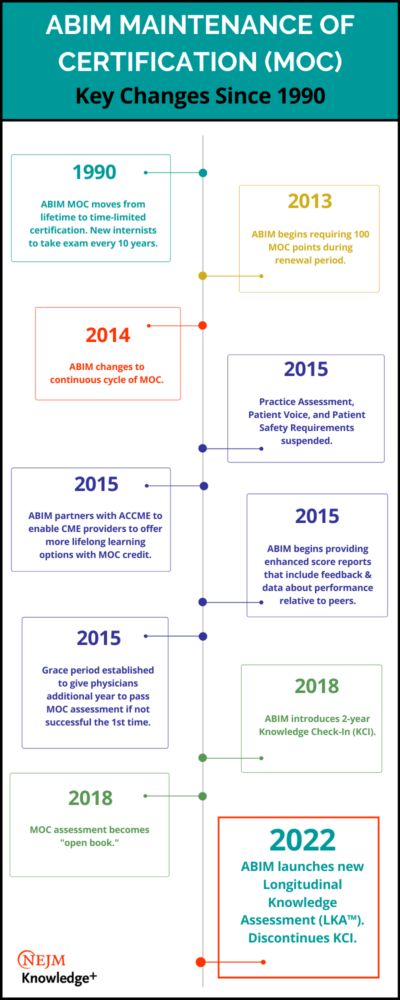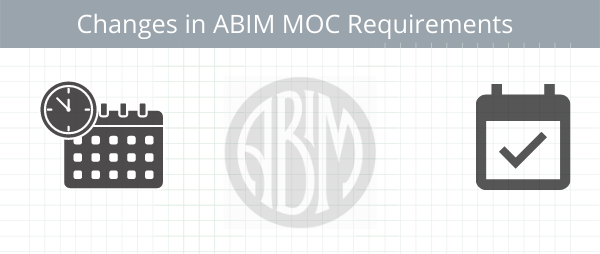If you’re a board-certified internist, you’re probably quite familiar with the controversy surrounding the American Board of Internal Medicine (ABIM) 2014 changes to Maintenance of Certification (MOC), as it sparked an outcry that has since led to a succession of reforms. You may also have found yourself frustrated at the hurdles the 2014 changes meant for you. Keeping up with the new requirements created a heavy burden for busy doctors who were forced to comply if they didn’t want to be publicly reported as “Not Participating” for not continually earning MOC Points or, even worse, “Not Certified” for not taking and passing the ABIM exam.
In response to an outpouring of feedback from diplomates and other stakeholders, ABIM began amending the MOC process in 2018 and, most recently in 2022, introduced a longitudinal assessment. To provide the big picture of the new landscape, we’ve put together a brief overview of the major ABIM MOC changes, what led to them, and how they will impact you.
ABMS Vision Initiative
ABIM’s move to a longitudinal assessment follows a 2019 report released by the American Board of Medical Specialties (ABMS) Vision Initiative, an independent and diverse group of stakeholders tasked with assessing the state of Maintenance of Certification (MOC). The report delivered a candid appraisal of ABMS’s member board MOC programs, including ABIM.
The ABMS report echoes criticisms from diplomates and other stakeholders that began when ABIM and other specialty boards transitioned from lifetime to time-limited certification in the early 1990s. Criticisms about relevance, cost, and the time it takes to complete MOC activities grew louder for ABIM when it instituted additional changes in 2014.
ABMS Maintenance of Certification Recommendations
The ABMS Vision Initiative delivered several recommendations for making MOC programs more relevant and valuable to physicians, patients, and the public. Some of these recommended changes that you may have already experienced or can soon expect to see include:
- MOC activities that are more relevant to everyday practice and help to improve patient care.
- Continuing certification centered on “advances in medical knowledge, new technology, emerging trends in population health, changes in clinical skills requirements, and changes in health care delivery systems.”
- Longitudinal and other formative assessment options that facilitate learning, help participants identify knowledge gaps, and are designed to keep medical knowledge current.
- Regular communications that allow for an open dialogue with diplomates and encourage continual feedback about MOC programs.
- Transparency and ongoing research to study MOC efficacy and aid in program improvement.
To follow up on the Vision Initiative’s findings, ABMS published Standards for Continuing Certification to promote quality, continuity, and consistency among its medical specialty boards’ MOC programs. Below are some of the ways that ABIM is applying these standards.
What Are the Latest ABIM MOC Changes?
To implement the Vision Initiative recommendations, ABIM has been making significant changes to its MOC program. Some changes were implemented prior to the Vision Initiative report. For example, in 2018, ABIM launched Knowledge Check-Ins, which were shorter two-year assessments that allowed diplomates to test from anywhere. They also made both the traditional ABIM exam and the Knowledge Check-Ins “open-book,” enabling the use of the medical reference software UpToDate® during assessments.
In 2022, the Knowledge Check-In was retired and replaced by the ABIM Longitudinal Knowledge Assessment (LKA™). The LKA™ allows internists and subspecialists to demonstrate their knowledge of the latest advances and treatments in medicine while also learning through formative assessment.
ABIM Recertification in 2022
To recertify in 2022 and beyond, eligible physicians must meet all MOC requirements including:
- Participating in activities that earn MOC points every two years.
- Earning at least 100 MOC points every five years.
- Meeting an ABIM assessment requirement: either passing the traditional ABIM MOC exam or participating in and eventually passing the LKA™.
ABIM continues to publicly report physicians’ status, including when they do not meet MOC requirements. Those who do not earn MOC points every two years are reported as “Participating in MOC: No,” and those who do not take a MOC assessment by their due date will be reported as “Not Certified.”
To learn more about your 2022 MOC requirements, check out our comprehensive ABIM MOC Requirements Guide.
ABIM Recertification Options
With the launch of the LKA™, board-certified internists now have options for the assessment portion of their ABIM MOC requirements. Those who prefer the one-and-done approach for meeting the assessment requirement of MOC can still take the traditional ABIM MOC exam, allowing them to prepare for and take the exam and then not worry about it for ten years. Others, who prefer to continually engage and learn through longitudinal assessment, can opt for the LKA™ program.
How NEJM Knowledge+ Internal Medicine Board Review Helps
ABMS’s Vision Initiative identified research that shows significant discrepancies between individuals’ perceptions about their knowledge versus their actual knowledge. The research illustrates that physicians often have challenges in self-assessing or identifying their own knowledge gaps. NEJM Knowledge+ Internal Medicine Board Review can help you overcome this challenge in two ways:
First, it is adaptive, which means questions are delivered based on your performance. In other words, the program’s algorithm adapts the content based on what you know and don’t know, automatically targeting your knowledge gaps and saving you valuable time.
Second, NEJM Knowledge+ asks you about your confidence level as you answer questions and then generates Confidence vs. Performance reports. These reports allow you to compare your actual performance with how you anticipated you would perform. This knowledge gap analysis not only helps you prepare for your assessment efficiently and effectively, but it also helps you develop self-awareness about your medical knowledge that improves your efficiency and efficacy in diagnosing and treating patients.
Regardless of which ABIM Recertification option you choose, NEJM Knowledge+ helps you prepare for your:
ABIM MOC Exam
If you prefer not to have the ongoing five-year commitment of the LKA™, NEJM Knowledge+ Internal Medicine Board Review is the most effective and efficient way to prepare for the ABIM MOC exam. Plus, it still allows you to enjoy the learning benefits of longitudinal assessment with a bank of over 5,000 questions that you can tackle at the pace that is right for you. Like the LKA™, you can access NEJM Knowledge+ from anywhere, on any device, at any time. Click here to learn more about how NEJM Knowledge+ Internal Medicine Board Review helps you prepare for your MOC exam.
ABIM LKA™
If you prefer the formative nature of the LKA™, NEJM Knowledge+ can help you practice for the assessment efficiently with adaptive learning. As with the LKA™, NEJM Knowledge+ questions provide detailed feedback to facilitate learning and improve your practice. Plus, if you use a timer such as the one on your phone, you can practice answering questions within the time limit you will have for LKA™ questions. (LKA™ participants get four minutes to answer each question, plus a 30-minute annual time bank they can tap if they need more time for any of the 120 yearly LKA™ questions.)
ABIM Recertification Requirements
If you still have questions about the latest ABIM recertification requirements, learn more with our detailed Guide to ABIM MOC Requirements.
Initially published in 2014, this blog post has been revised to provide you with the most recent information about 2022 changes to ABIM recertification.









Thank you for updates about CME!